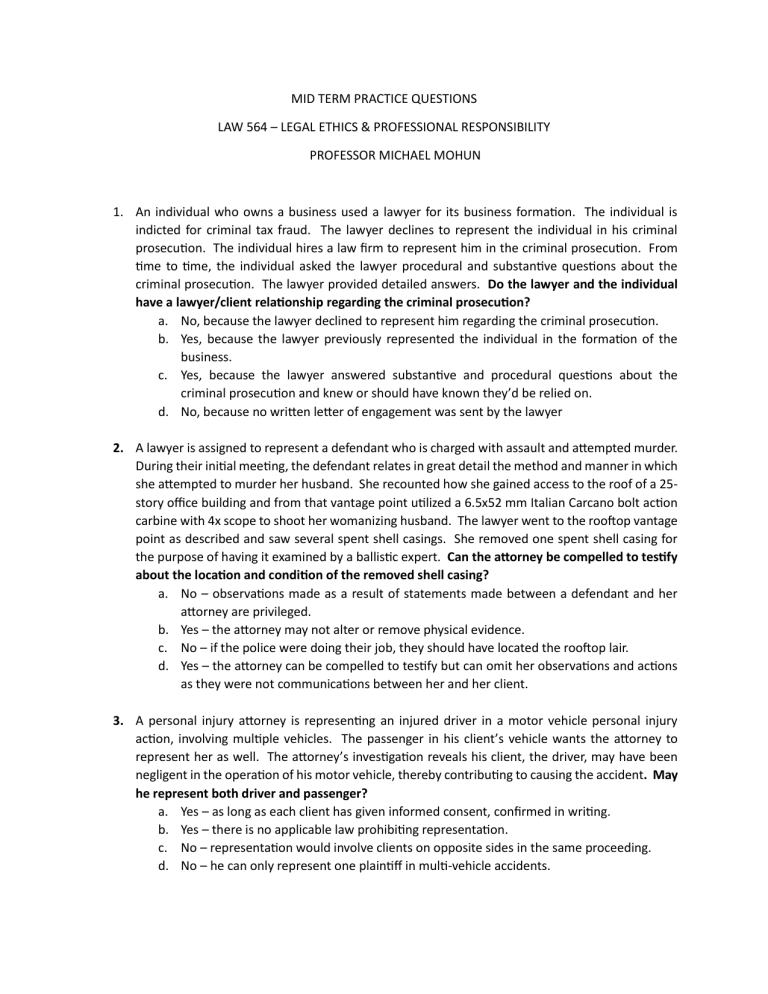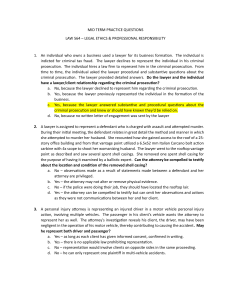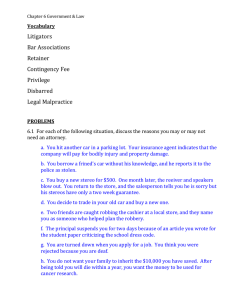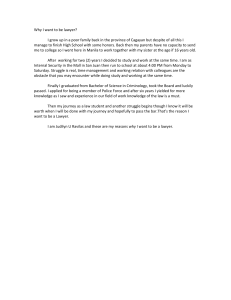
MID TERM PRACTICE QUESTIONS LAW 564 – LEGAL ETHICS & PROFESSIONAL RESPONSIBILITY PROFESSOR MICHAEL MOHUN 1. An individual who owns a business used a lawyer for its business formation. The individual is indicted for criminal tax fraud. The lawyer declines to represent the individual in his criminal prosecution. The individual hires a law firm to represent him in the criminal prosecution. From time to time, the individual asked the lawyer procedural and substantive questions about the criminal prosecution. The lawyer provided detailed answers. Do the lawyer and the individual have a lawyer/client relationship regarding the criminal prosecution? a. No, because the lawyer declined to represent him regarding the criminal prosecution. b. Yes, because the lawyer previously represented the individual in the formation of the business. c. Yes, because the lawyer answered substantive and procedural questions about the criminal prosecution and knew or should have known they’d be relied on. d. No, because no written letter of engagement was sent by the lawyer 2. A lawyer is assigned to represent a defendant who is charged with assault and attempted murder. During their initial meeting, the defendant relates in great detail the method and manner in which she attempted to murder her husband. She recounted how she gained access to the roof of a 25story office building and from that vantage point utilized a 6.5x52 mm Italian Carcano bolt action carbine with 4x scope to shoot her womanizing husband. The lawyer went to the rooftop vantage point as described and saw several spent shell casings. She removed one spent shell casing for the purpose of having it examined by a ballistic expert. Can the attorney be compelled to testify about the location and condition of the removed shell casing? a. No – observations made as a result of statements made between a defendant and her attorney are privileged. b. Yes – the attorney may not alter or remove physical evidence. c. No – if the police were doing their job, they should have located the rooftop lair. d. Yes – the attorney can be compelled to testify but can omit her observations and actions as they were not communications between her and her client. 3. A personal injury attorney is representing an injured driver in a motor vehicle personal injury action, involving multiple vehicles. The passenger in his client’s vehicle wants the attorney to represent her as well. The attorney’s investigation reveals his client, the driver, may have been negligent in the operation of his motor vehicle, thereby contributing to causing the accident. May he represent both driver and passenger? a. Yes – as long as each client has given informed consent, confirmed in writing. b. Yes – there is no applicable law prohibiting representation. c. No – representation would involve clients on opposite sides in the same proceeding. d. No – he can only represent one plaintiff in multi-vehicle accidents. 4. An attorney who formerly represented a client is sued by that client for malpractice. To defend himself, he intends to reveal confidential information learned during his representation of the client. Can he? a. No – no exception exists that would allow his disclosure. b. Yes – he owes no duty of loyalty or competence to the former client. c. Yes – he may to the extent necessary respond to allegations concerning his representation. d. No – he must first ask the court to issue a ruling. 5. A lawyer worked for the NYS Department of Corrections. Her job was “sentencing review”. Essentially, she reviewed Judge’s sentences of criminal defendants for their legality. She recently left government work and accepted a position with a law firm where her primary job was representing state inmates in the custody of the Department of Corrections who are injured while confined. Is she subject to discipline? a. Yes – she did not obtain informed consent in writing. b. No – because she didn’t participate personally and substantially in defending the NYS Department of Corrections in regard to inmate lawsuits. c. Yes – she has violated her duty of loyalty. d. No – she has no duty of loyalty to a government agency.



